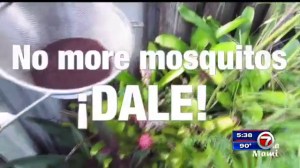(WSVN) - With Zika and mosquitoes on everyone’s mind, you’ve probably heard experts recommend protecting your skin with something called DEET, but what else works to block the bite, and what doesn’t? 7’s Sheldon Fox has our special assignment report.
They’re small but pack a big bite, and they’re out for blood.
So repelling the Aedes aegypti mosquito, the species known to transmit the Zika virus, has recently become a top priority for us, their unwitting human hosts.
Dr. Jonathan Day, Florida Medical Entomology Lab: “Repellents are working in a couple of ways.”

Experts say, stick with insect repellents registered with the Environmental Protection Agency. They contain the following active ingredients:
- DEET
- picaridin
- IR3535
- oil of lemon eucalyptus
- para-menthane-3,8-diol, or PMD
Jonathan Day, a professor at the Florida Medical Entomology Laboratory, says DEET, the most common chemical in repellents, is believed to work by confusing mosquitoes.
Jonathan Day: “The theory is that DEET interferes with the carbon dioxide receptors on the mosquito.”
Consumer Reports tested repellents and found ones containing the right percentages of DEET, picaridin and oil of lemon eucalyptus work to prevent bites from aggressive mosquitoes.
But…
Jonathan Day: “Oil of citronella, vanilla oil, geranium oil, those repellents don’t work very well.”
The reason? They wear off too quickly.
Zika has also spawned claims about a number of products that simply do not work.
The New York Attorney General’s Office recently sent cease and desist letters to seven companies it says falsely marketed their products.
The attorney general demanded they stop advertising them as “Zika-protective” or “Zika preventive.” The items include children’s stickers, as well as bracelets and wristbands.
Then, there’s the very Miami myth that Cuban coffee sprinkled in the yard will stop the biting bloodsuckers. One video has circulated on the internet.

Jonathan Day: “Initially, there is some irritation, and it may clear an area for a brief period of time. But again, this is just the repacking of an old story.”
Bottom line, say experts, try to avoid being outside when mosquitoes are most active — in the early morning and late afternoon. When you are out, wear long-sleeved shirts and pants.
And, of course, use repellent applied the correct way: on exposed skin, but not over cuts, wounds or near your eyes and mouth.
Jonathan Day: “The person has a can of DEET, and they’re spraying it around them like an aerosol, spraying it around their head, and that’s a terrible way to apply DEET. If you have a small area of your skin that you miss, even an area the size of a dime, mosquitoes can find that area and blood feed on it.”
Another tip: Do not let children handle repellents. Instead, apply it on them yourself.
Also, the Centers for Disease Control and Prevention says products with oil of lemon eucalyptus or para-menthane-3,8-diol should not be used on children under 3.
FOR MORE INFORMATION:
Prevent Mosquito Bites
www.cdc.gov/zika/prevention/prevent-mosquito-bites.html
Consumer Reports Tests
www.consumerreports.org/insect-repellents/mosquito-repellents-that-best-protect-against-zika/
Copyright 2024 Sunbeam Television Corp. All rights reserved. This material may not be published, broadcast, rewritten or redistributed.
